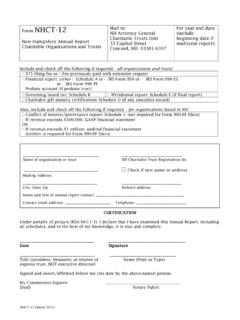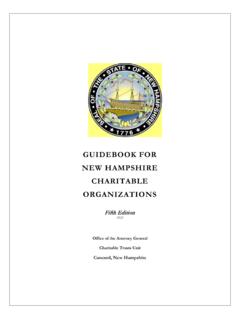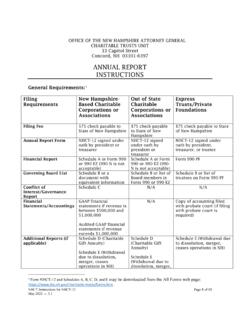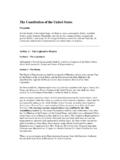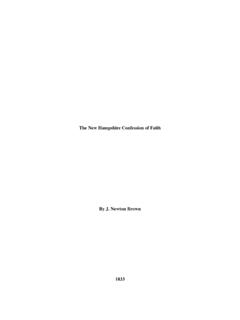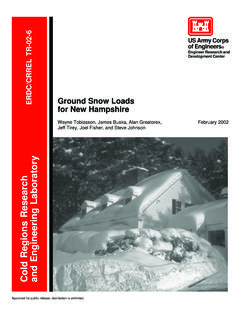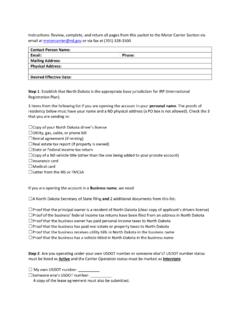Transcription of Right to Know - New Hampshire Attorney General
1 Attorney General DEPARTMENT OF JUSTICE 33 CAPITOL STREET CONCORD, NEW Hampshire 03301-6397 ANN M. RICE DEPUTY Attorney General JOSEPH A. FOSTER Attorney General Telephone 603-271-3658 FAX 603-271-2110 TDD Access: Relay NH 1-800-735-2964 March 20, 2015 To the People of New Hampshire : I am proud to issue this updated Memorandum on New Hampshire s Right -to- know law, RSA Chapter 91-A. This Memorandum describes the statute and the judicial decisions that further define and explain the peoples Right to know . The public s Right to know what its government is doing is a fundamental part of New Hampshire s democracy. New Hampshire s Constitution and the Right -to- know law ensure that the public has reasonable access to meetings of public bodies and to governmental records. When New Hampshire s Constitution was adopted on June 2, 1784, accountability of public servants to the people was established in Part 1, article 8, which reads: All power residing originally in, and being derived from, the people, all the magistrates and officers of government are their substitutes and agents, and at all times accountable to them.
2 In 1976, the people of New Hampshire amended Part 1, article 8 of our Constitution, reinforcing the existence of a Right of access to public meetings and records, by adding the following two sentences: Government, therefore, should be open, accessible, accountable, and responsive. To that end, the public s Right of access to governmental proceedings and records shall not be unreasonably restricted. An integral part of the constitutional Right of access to government is the protection of the freedom of speech and press guaranteed by Part 1, article 22 of the New Hampshire Constitution: Free speech and liberty of the press are essential to the security of freedom in a state: They ought, therefore, to be inviolably preserved. Right -to- know Law To the People of New Hampshire March 20, 2015 Page 2 of 3 These provisions of our Constitution and RSA Chapter 91-A are intended to provide the utmost information to the people about what their government is doing, while preserving individuals rights to privacy.
3 The New Hampshire Supreme Court has recognized that the Right -to- know law helps to carry out the Constitution s requirement that access to governmental proceedings and records not be unreasonably restricted. Since the Department last issued its Memorandum, the New Hampshire Legislature has amended the Right -to- know law in several ways. The law now allows consideration of confidential, commercial, or financial information in nonpublic session. The master jury list is now exempt from the Right -to- know law. Officers, employees and other officials of a public body or public agency are now subject to a civil penalty of not less than $250 and not more than $2,000 if they are found to have violated the Right -to- know law in bad faith. Such individuals may now also be required to undergo remedial training at their own expense. This Memorandum has been updated to reflect these amendments to the law and recent court decisions.
4 In an effort to enhance the usefulness of this Memorandum, the appendix includes sample motions for use by public bodies when the members want to go into non-public session, seal non-public minutes, or adjourn to consult with legal counsel. It also includes a sample index for use when a person has requested documents that are exempt from disclosure or contain confidential information. The index can be used to inform the requester of which documents have been withheld and the reason for their non-disclosure. For those interested in municipal government records, the statute that establishes the retention period for municipal records is provided. Finally, the appendix includes a list of statutes, rules, and court cases the designate certain information as confidential or privileged. I strongly recommend that all public officials learn their responsibilities under the Right -to- know law. It is important for those public officials who use e-mail or who maintain government records in electronic form to carefully study the 2008 and 2009 changes to the law relating to electronic records.
5 This Memorandum should be kept easily accessible and be referred to when you are faced with questions on the application of the law. When you are uncertain about the application of the law to a specific circumstance, state officials should consult with my Office, county officials should consult with their County Attorney , and municipal and schools officials should consult with their legal counsel. I am making this Memorandum widely available to the public, the press, New Hampshire s schools, and State and local officials. It will also be posted on the Department s website. Sincerely, Joseph A. Foster Attorney General #1061112 Attorney General DEPARTMENT OF JUSTICE 33 CAPITOL STREET CONCORD, NEW Hampshire 03301-6397 ANN M. RICE DEPUTY Attorney General JOSEPH A. FOSTER Attorney General March 20, 2015 Attorney General S MEMORANDUM ON NEW Hampshire S Right - TO- know LAW, RSA CHAPTER 91-A Telephone 603-271-3658 FAX 603-271-2110 TDD Access: Relay NH 1-800-735-2964 i TABLE OF CONTENTS I.
6 DEFINITIONS .. 1 II. BODIES AND AGENCIES SUBJECT TO THE Right -TO- know LAW .. 3 A. State Entities Public Bodies .. 3 B. State Entities Public Agencies .. 4 C. County And Municipal Governments Public Bodies .. 4 D. County And Municipal Government Public Agencies .. 5 III. ENTITIES NOT SUBJECT TO THE Right -TO- know LAW .. 6 IV. MEETINGS .. 7 A. What Constitutes a Meeting of a Public Body? .. 7 B. Not a Meeting .. 8 C. Notice RSA 91-A:2 .. 10 1. Regular Notice .. 10 2. Emergency Notice Procedure .. 11 3. Notice of Legislative Meetings .. 11 4. Broader Access .. 11 5. Effect of Failure to Observe Notice Requirements .. 12 D. Meeting Procedures .. 12 1. Member Participation and Attendance at Meetings .. 12 2. Basic Meeting Requirements .. 13 3. Emergency Meetings .. 15 4. Characteristics of Non-Public Sessions.
7 15 V. GOVERNMENTAL RECORDS .. 20 A. What is a Governmental Record? .. 20 B. Examples of Governmental Records Required to be Disclosed .. 21 C. Examples of Electronic Governmental Records Required to be Disclosed .. 22 D. A Public Body s Duty to Maintain Electronic Records .. 23 E. Settlements of Lawsuits by Municipalities .. 24 F. Exemptions From Disclosure .. 24 G. Other Exceptions to Disclosure .. 29 H. Law Enforcement Investigative Files .. 30 I. Guidance In Producing Law Enforcement Investigative Records .. 31 1. Interference with Law Enforcement Proceedings .. 32 2. Accused s Right to a Fair Trial .. 32 3. Unwarranted Invasion of Privacy .. 33 4. Confidential Source .. 34 5. Investigative Techniques and Procedures .. 35 6. Endangering Life or Physical Safety of Any Person .. 35 ii J. Burden of Proof for Not Disclosing a Governmental Record.
8 36 K. Public Inspection of Governmental Records RSA 91-A:4, IV .. 37 L. Other Considerations of Public Inspection of Governmental Records .. 43 M. FOIA- The Federal Freedom of Information Act .. 43 VI. REMEDIES .. 46 A. Injunctive Relief RSA 91-A:7 .. 46 B. Attorney s Fees and Costs RSA 91-A:8 .. 46 C. Invalidation of Agency Action .. 47 D. Sanctions .. 47 E. Destruction of Records .. 48 VII. COURT 49 A. The Right -To- know Law Does Not Apply to Court Records .. 49 B. Sealed Court Records .. 49 INDEX .. 50 TABLE OF AUTHORITIES .. 53 APPENDIX A RSA Chapter 91-A .. 57 APPENDIX B - Model Non-Public Session/Legal Consultation Procedures/Motions .. 68 APPENDIX C - Right -to- know Request Index of Fully Redacted Pages .. 73 APPENDIX D - RSA Chapter 33-A Disposition Of Municipal Records .. 76 APPENDIX E Model State RFP Public Disclosure Language.
9 94 APPENDIX F New Hampshire Statute, Court Decisions, and Court Rules Making Information Confidential or Non-public .. 96 iii This Memorandum cites to both New Hampshire Supreme Court opinions and Superior Court orders. Unlike New Hampshire Supreme Court opinions, Superior Court orders and decisions are not binding precedent. Instead, such decisions and orders may be persuasive authority for courts when analyzing RSA 91-A issues. At the least, these cases provide guidance to state and municipal agencies, public bodies and employees. 1 Right -TO- know LAW MEMORANDUM Openness in the conduct of public business is essential to a democratic society. The purpose of this chapter is to ensure both the greatest possible public access to the actions, discussions and records of all public bodies, and their accountability to the people. RSA 91-A:1. The Supreme Court resolve[s] questions regarding the [ Right -to- know ] law with a view to providing the utmost information in order to best effectuate the statutory and constitutional objective of facilitating access to all public documents.
10 WMUR v. Dept. of Fish and Game, 154 46 (2006) (quoting Goode v. Legislative Budget Assistant, 148 551, 553 (2002)). The public s Right of access to governmental proceedings .. is not absolute.. It must yield to reasonable restrictions. Hughes v. Speaker of the New Hampshire House of Representatives, 152 276, 290 (2005) (citing Petition of Union Leader, 147 603, 604-05 (2002); Const. Pt. I, art. 8). I. DEFINITIONS The following definitions apply to the Right -to- know law: Advisory committee means any committee, council, commission, or other like body whose primary purpose is to consider an issue or issues designated by the appointing authority so as to provide such authority with advice or recommendations concerning the formulation of any public policy or legislation that may be promoted, modified, or opposed by such authority. RSA 91-A:1-a (I). Governmental proceedings means the transaction of any functions affecting any or all citizens of the state by a public body.
